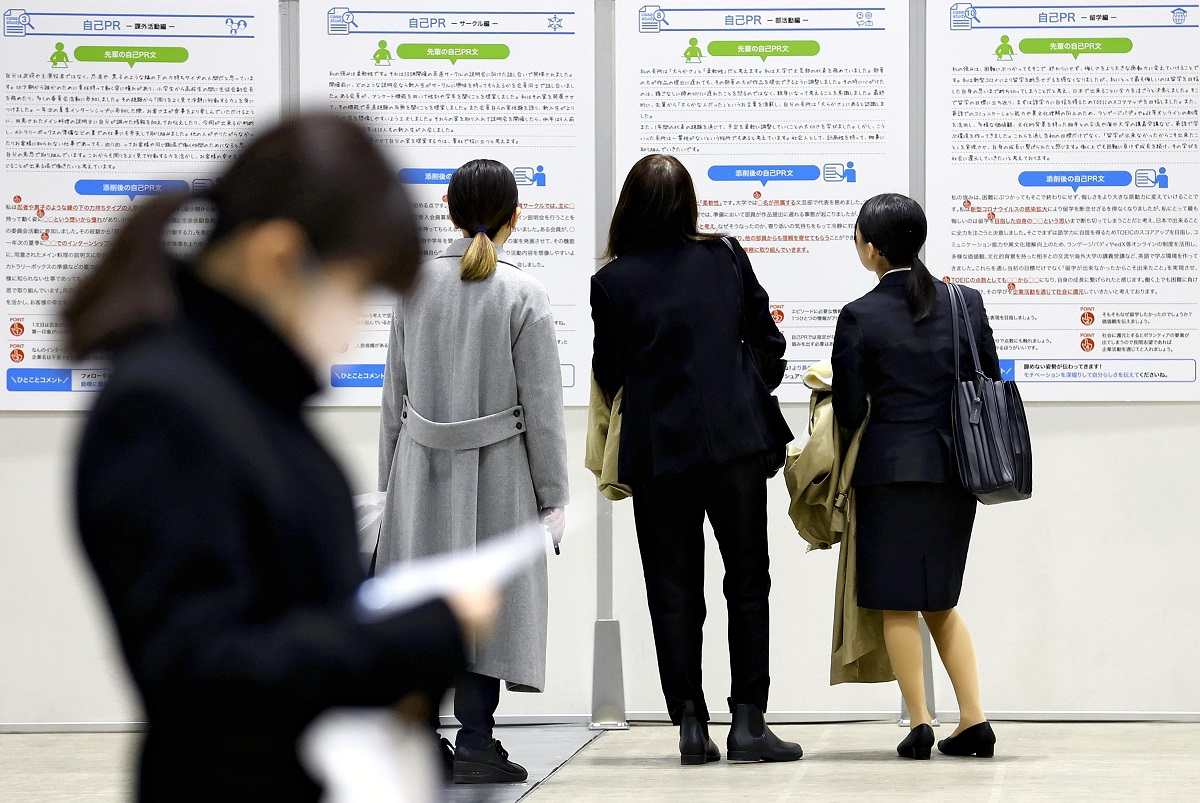Japan Companies Raise Starting Salaries for New Graduates; Retention of Young Employees a Concern

Students look at posters at a joint job fair held by Mynavi in Yokohama earlier this month.
12:32 JST, March 26, 2024
An increasing number of companies are raising their starting salaries as they look to hire and retain talented people. The low birthrate and high turnover rates of young employees, combined with the need to secure new personnel to deal with digitalization and other challenges, are issues they are having to face.
Major steel company JFE Steel Corp. decided to raise its monthly starting salaries by ¥50,000 to ¥282,000 for university graduates and by ¥40,000 to ¥220,000 for high school graduates joining this April. This is a significant increase of over 20% from the previous year.
In recent years, JFE has prioritized streamlining, such as by suspending operations of a blast furnace in Kawasaki and reducing the number of new hires. In fiscal 2024, the company will instead increase the number of new hires for on-site and clerical positions by 60%.
According to the Institute of Labor Administration, a private research company, the average monthly starting salary for university graduates will increase by 3.1% to ¥225,686 and by 3.7% to ¥183,388 for high school graduates from April.
In the 2024 “shunto” labor-management wage negotiations, Nippon Steel Corp. offered a pay-scale rise that exceeded what its labor union had sought. Other companies also offered high pay raises in this year’s shunto negotiations. “We need to hire diverse talent to promote digitalization, overseas operations and decarbonization,” an official from a major steel manufacturer said. Amid this situation, more and more companies are starting to offer starting salaries that far exceed the average level.
Dai-ichi Life Holdings, Inc. raised its monthly starting salary by ¥45,000 to ¥321,000 for university graduates joining in April. Itochu Corp. will pay a monthly starting salary of ¥305,000, up ¥50,000 from the previous year.
Mizuho Bank, Ltd. will raise its monthly starting salary to ¥260,000 this April. Miyazaki Bank, Ltd. and the Bank of Fukuoka, Ltd. — regional banks in Kyushu — will raise their monthly starting salaries to the same level for university graduates joining in April 2025, which is an increase of ¥55,000 for Miyazaki Bank and ¥45,000 for the Bank of Fukuoka.
An official from a regional bank said: “We have to compete with major companies in Tokyo to acquire people who are from our region and studied in Tokyo. We cannot stand on the same stage unless we offer high starting salaries.”
30% of new hires quit within 3 yrs
On top of the decreasing number of new graduates due to the declining birthrate, companies are also concerned about the high turnover rates of young employees.
According to the Health, Labor and Welfare Ministry, 32.3% of employees who had graduated from universities in March 2020 left their jobs within three years.
“Some people quit because they are dissatisfied with their work, while low wages for younger employees due to deflation are another cause for the high turnover rates,” an official from a major manufacturing company said.
An increasing number of companies are now focusing on raising wages for young employees to increase retention rates. In policy talks by the Japan Business Federation (Keidanren) for this year’s shunto negotiations, Keidanren asked member companies to consider pay-scale increase for all employees, so their starting salary hike would not result in new employees receiving higher salaries than other employees close to them in age.
Nomura Holdings, Inc. will raise its monthly starting salary by ¥20,000 to ¥265,000 for new employees joining its affiliate company Nomura Securities Co. this April, while increasing wages for young employees in their first, second and third years of employment by 16% on average. Nomura Holdings President Kentaro Okuda said, “There are many young employees who quit, but we want to increase our competitiveness by acquiring talented people.”
JFE raised wages for all its employees by an average of 12.5%, including the annual wage hike, in this year’s shunto negotiations and the pay raises for high school graduate employees aged 18 to 29 reached 18.5%.
Kozue Togo, a chief researcher at Mynavi Career Research Lab, said: “A starting salary is a key factor for students when choosing companies to work for. In order to keep employees for a long period of time, companies need to promote themselves with their employee benefits and the significance of their work.”
Top Articles in Business
-

Japan, Italy to Boost LNG Cooperation; Aimed at Diversifying Japan’s LNG Sources
-

Honda to Launch New Electric Motorbike in Vietnam
-

Asics Opens Factory for Onitsuka Tiger Brand in Western Japan
-

Japan’s ANA to Introduce Nationwide Logistics Service Using Drones, Will Be Used to Deliver Supplies in Remote Areas
-

Narita Airport, Startup in Japan Demonstrate Machine to Compress Clothes for Tourists to Prevent People from Abandoning Suitcases
JN ACCESS RANKING
-

Univ. in Japan, Tokyo-Based Startup to Develop Satellite for Disaster Prevention Measures, Bears
-

JAL, ANA Cancel Flights During 3-day Holiday Weekend due to Blizzard
-

Japan Institute to Use Domestic Commercial Optical Lattice Clock to Set Japan Standard Time
-

China Confirmed to Be Operating Drilling Vessel Near Japan-China Median Line
-

China Eyes Rare Earth Foothold in Malaysia to Maintain Dominance, Counter Japan, U.S.
























